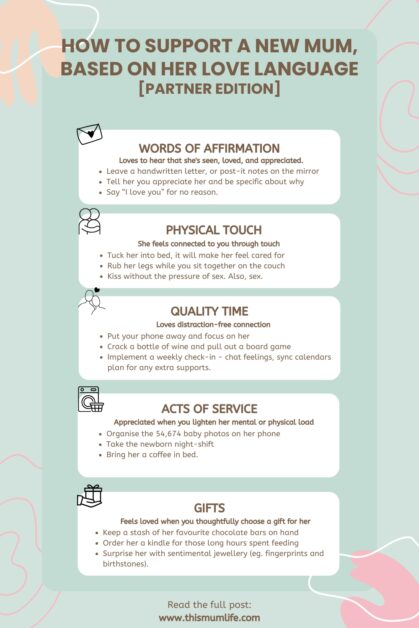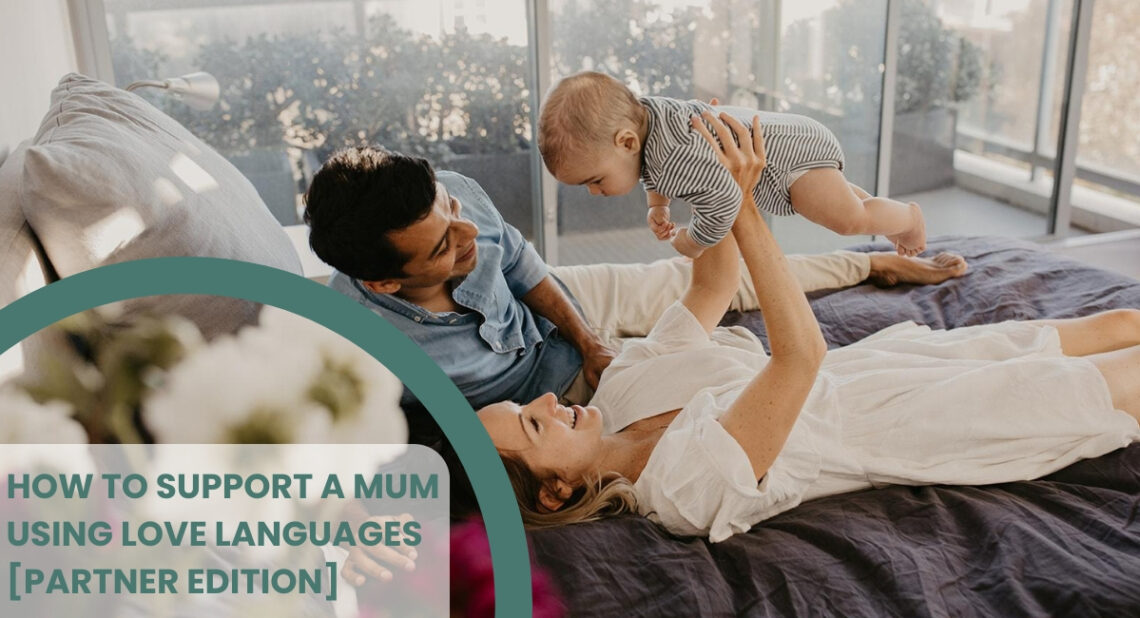Becoming a parent changes everything – including (and especially) your relationship.
Whether your partner just had a baby, or you’re now counting years, not months, past-partum, you want to support her in a way that really lands for her. So if you’re wondering how to support your partner after baby, this one’s for you.
Enter: Love languages.
The idea is pretty simple; people like to give and receive love in different ways. By understanding how a person likes to receive love, we can learn how to better make them feel loved and seen. Most often used within romantic relationships, they are a great tool when thinking about how you can best support your partner as they navigate the post-natal weeks, months, and even years.
This post is for anyone supporting a mum – whether you’re a partner, co-parent, husband, wife or something in between. And if you are a new mum, this may be exactly what you’ve been thinking but haven’t had the time or energy to say out loud.
You can read more about the five love languages and take the quiz here, but if you want to skip ahead, I’ve summarised them below.

So first step: figure out her love language. And don’t guess! That’s just lazy. Second step: go forth and show her just how important she is, with my (totally non-exhaustive) list of ways you can help your partner in the early days, months, weeks and even years post-birth.
Ways to support a new mum, based on her love language
Acts of Service
Acts of service is my love language! With this one, it’s all about making her life a little bit easier, even if that means yours gets a little bit harder (weirdly, it’s often more appreciated if it makes your life a little harder!). Look for little things you can do, and most importantly, don’t wait for your partner to ask for help.
- Organise her photos. Does she need 653 photos from baby’s first swim? No. Will she ever get around to culling them herself? Also no.
- Plan and cook dinners
- Anticipate the little jobs before she notices (quietly – don’t make a big deal of it).
- Take on a share of the overnight wakes and early mornings
- Bring her a coffee in bed
- Make her some lactation cookies or bliss balls and keep the feeding area stocked
- Book her a massage (or nails, or float tank… whatever her luxury of choice is)
- Got multiple kids? Take the baby so your partner can have quality time with your older child.
Physical Touch
Ok so I have to admit I was staggered by how many of my friends want physical touch post-baby. I was totally touched out for the first few years of life as a SAHM, so I definitely had to take this one to the people! It seems that the key to physical touch post-baby is a feeling of connection; a reminder that before there were the three (or four… or more…) of you, there were the two of you.
- Hold hands… not exactly groundbreaking, I know.
- Tuck her into bed – pull the blanket up, smooth her hair and kiss her forehead. Make her feel cared for.
- Snuggle on the couch
- Put ‘your’ song on and dance in the kitchen – remind her of the days when you were two.
- Rub her shoulders (or feet, or legs!) while you’re watching television
- Brush their arm as you walk by
- Kiss without the pressure of sex…
- Also, sex.
Quality Time
Time is one thing noone ever has enough of post-baby, which makes quality time seem an even loftier goal. The key to this one is to remove all external distractions and focus on each other. Remember it doesn’t necessarily have to be a long time; it’s the quality that counts.
- Book a babysitter and head out for dinner…
- Or, cook at home after your kids are asleep (but treat it like a night out!)
- Weekly check-ins – sit down together and chat about how you’re feeling, what’s coming up for the week and how you can support each other
- Crack a bottle of wine and pull out a board game
- Turn your phone off while you’re together (as often as possible!)
- Work out together and release those endorphins (you can do it at home, and 25 minutes is all you need – try this one)
- Head out for a walk and listen to a podcast together; it creates connection without the pressure to talk.
Words of Affirmation
You’re probably thinking a lot of nice things, but if your partner’s love language is Words of Affirmation it’s important to say those nice things out loud (even if it makes you uncomfortable).
- Write a letter, including all the things you love about her
- Record a voice memo and send it to her from work
- Leave post-it note messages on the mirror each morning (it’ll give her something to look forward to)
- Say simple things like “I love you” and “we are so lucky to have you”
- If she’s on leave while you’re back at work, tell her how much you appreciate the sacrifice she’s making to her own career
- And if she’s back at work, acknowledge how difficult it must be to be away from her baby
- Post a card, sharing why you appreciate her
- Set a recurring calendar event that tells her what an awesome job she’s doing.
Receiving Gifts
I feel like Receiving Gifts as a love language gets a bad rap, but truly, it isn’t about the expense or size of a present, it’s about someone thinking of you, and choosing something they think will bring you happiness.
- Make a playlist for her to listen to during the many hours she’ll spend feeding your newborn
- Pick up her favourite chocolate bar (or any indulgence) on the way home.
- Gift her a kindle – the ultimate gift for mums who love to read while breastfeeding
- Sentimental jewellery that connects them to their children – I wear fingerprint necklaces like this, but initial jewellery and birthstone pieces are also popular.
- A small luxury that she would never buy for herself; like a super fancy hand cream, face mask or candle
- Got older kids? Help them make her a special gift – call me crazy but I will never tire of my handmade keyring collection
- Or maybe she’d prefer something that reminds her of life before kids – books, luxury sleepwear, candles, workout gear (those little indulgences she may not have time for now!).
LOVE LANGUAGES FOR NEW MUMS – CHEAT SHEET (pin it for later)

Not all of these suggestions will make sense for every mum, but hopefully they’ll give you a few ideas on how to support your partner after baby, and open up the conversation.
Got any other suggestions? I’d love to hear about them in the comments.
Oh and mums: Send this to your person, now.
